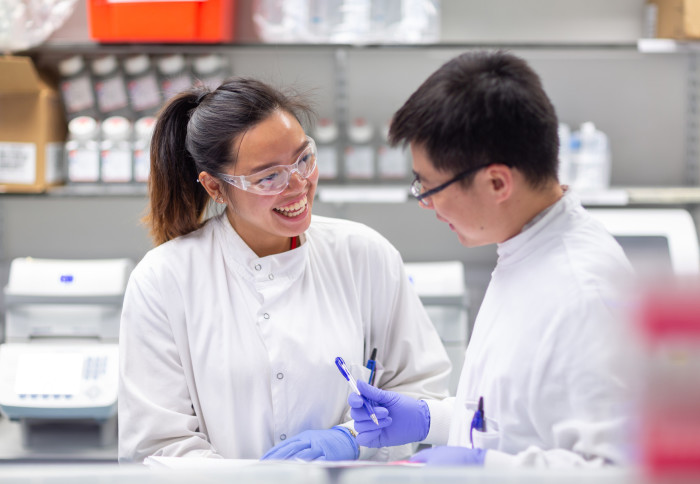New PhD studentships to boost partnerships at the Institute of Clinical Sciences
by Ellyw Evans

The new interdisciplinary programme for postgraduate students aims to strengthen collaboration by combining scientific expertise across Imperial.
The Institute of Clinical Sciences has announced the first five PhD studentships awarded as part of a new interdisciplinary programme designed to extend links between the MRC London Institute of Medical Sciences, Imperial College London and an important cohort of external partners.
The Institute of Clinical Sciences (ICS) is one of eight departments within the Faculty of Medicine. It includes the MRC London Institute of Medical Sciences (LMS), a core-funded institute of the MRC.
The scheme, called the Strategic Alliance of MRC-University Research Investments at Imperial (SAMURII), develops new partnerships with a focus on innovation across traditional discipline boundaries. Jointly funded by LMS and ICS, the SAMURII scheme will support gifted postgraduate students to embark on research training at the interface between disciplines.
Promote interdisciplinarity
Professor Dame Amanda Fisher, Head of the Institute of Clinical Sciences, who established the scheme was impressed by the high quality of applications: “There is huge potential for creating scientific advances by combining expertise across the College. Funding bodies are increasingly asking for team approaches to scientific challenges and schemes like SAMURII provide routes to explore avenues for longer-term collaboration.”
Dean of the Faculty of Medicine, Professor Jonathan Weber, is also a strong supporter of SAMURII. He said: “I applaud this new initiative from Dame Mandy Fisher and the MRC LMS; Imperial is constantly seeking to promote interdisciplinarity and this new PhD scheme will be an ambitious addition to our capital programmes, in forging new scientific collaborations across disciplines.”
2021 Studentships
The 2021 awards support five exciting new projects spanning from therapeutic resistance in cancer to polymeric nanoparticles. The projects are co-supervised by LMS, the Imperial Institute of Chemical Biology, the Rosalind Franklin Institute and the MRC Centre for Environment and Health.
The five PhD projects are:
- Chris Schiering (LMS) and Nazila Kamaly (Institute of Chemical Biology)
- Immunomodulation of gut endothelium in inflammatory diseases using targeted polymeric nanoparticles
- Christian Speck (ICS), David Rueda (LMS and Department of Infectious Disease),Matthew Fuchter, Marco Di Antonio (Institute of Chemical Biology) and Axel Behrens (CRUK Convergence Science Centre)
- Development of a high throughput assay for screening of DNA licensing inhibitors
- Louise Fets (LMS), Yuval Elani (Institute of Chemical Biology) and Leon Barron (MRC Centre for Environment and Health) with Tony Edge and Matt James (VWR International Limited)
- Measuring heterogeneity of drug uptake at the single-cell level to improve understanding of therapeutic resistance in cancer
- Matthias Merkenschlager (LMS) and Peijun Zhang (Rosalind Franklin Institute)
-
- IMAGinG: Regulatory interactions with active and repressive nuclear compartments
- Michelle Percharde/Petra Hajkova (LMS) and Jim Naismith (Rosalind Franklin Institute)
- Structural investigation of chromatin reprogramming and organization in development.
In future years the Scheme will be extended to embrace similar opportunities at College-supported institutes, MRC Centres, as well as with Industry and teams at LKCMedicine – Imperial’s partner medical school in Singapore.
New collaborations
Louise Fets (LMS), Yuval Elani (UKRI Future Leaders Fellow, Institute of Chemical Biology) and Leon Barron (MRC Centre for Environment and Health) are one of the new teams brought together by SAMURII. Together with their industrial collaborator at VWR International Limited, the team are aiming to develop and validate a new microfluidics-mass spectrometry platform to measure small molecule drugs in single cells at high sensitivity. They bring together Dr Fets’ expertise in cancer drug metabolism with Dr Elani’s experience in microfluidics and Dr Barron’s analytical chemistry.

Dr Louise Fets, said: “The aim is to measure the heterogeneity of drug uptake at the single-cell level to improve understanding of therapeutic resistance in cancer, but we’re aiming to develop a plug-and-play technology that can be used for a whole range of single-cell biomedical challenges. This is a really exciting opportunity to bring our expertise together to create something that none of us could do alone.”
Apply for a studentship
The awarded studentships are available from October 2021 and are currently being advertised on the LMS website.
Article supporters
Article text (excluding photos or graphics) © Imperial College London.
Photos and graphics subject to third party copyright used with permission or © Imperial College London.
Reporter
Ellyw Evans
Faculty of Medicine Centre